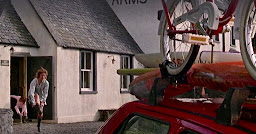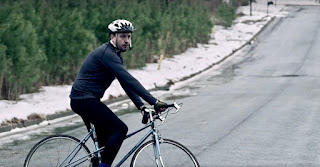 Anselm Kiefer, “I want to fly my bicycle”, neo-expressionist lead, steel, and wire sculpture; artist is best known for exposing authoritarian atrocities for decades and never more timely.
Anselm Kiefer, “I want to fly my bicycle”, neo-expressionist lead, steel, and wire sculpture; artist is best known for exposing authoritarian atrocities for decades and never more timely.Christian clerics wear cassocks to show they live to serve. These garments were inspired by padded riding tunics of nomadic Persian adventurers who performed good deeds at the bidding of those who deserved kind boons. Slowly soutanes withered to nothing more than ceremonial vestments bereft of importance, possibly because nobody anymore quite knows adornment type, button number, fringe material, sash selection, or such regalia and rules befitting a false sense of majesty and traditions to which they cling. Bicyclists’ bib tights more closely resemble original outfit, but churches frown upon congregants who don lycra or dress down.
Good deeds for community’s sake supposedly satisfy self and serve others, but none go unpunished. You can hardly help anyone without interference from their questions and resentments. No number of arguments or explanations overcome distrusts and misgivings. Letting down one’s guard when all goes well for a while can be such an extravagant luxury after signing over one’s rights unnecessarily at insistence of bankers, bill collectors, or insurers. People only accept assistance on their own terms, even when they don’t understand what’s going on, thus adding to chaos and blocking their prepotence. Blame assessing and finger pointing immediately ensue. To paraphrase Jean-Paul Satre, “Condemned to your freedom machine, Hell is other people interfering with your scene.”
Church times, city planning, and cycling politics haunt Dave Walker’s cartoons.
Another rainy day? Early New England Springs extend into interludes of misery and mud as ground heats, permafrost melts, and sequestered carbon emerges into atmosphere. No wonder climate tracers warn of eroding glaciers and skies are gray every day. Drizzle keeps many riders out of saddle, while black mold and tree pollen makes for allergic bike rides and potential asthma attacks. Consequently, new insights and reveals elude. Aged, belligerent, cantankerous, damaged dowagers, and indeed Labann, indiscriminately shower angry, burnt, cautionary factoids upon apathetic readers who don’t heed because they can. Why bother preaching?
Never roll through a shiny spot or standing water masking a pothole, which can trap entire wheel causing an endo. A helmet with a brim helps keep drips out of eyes. Goggles fog and obscure outlook. Gloves improve grip and protect hands in a fall. Beware of hypothermia; dress in warm, wicking clothes, windbreaker, and winter shoe covers. Cash, cell and keys belong in a zip-lock baggie to deter getting soaked by gutter juices. “Acqua e sapone,” they actually say. Clean and dry bacteria laden apparel, bike, and equipment; re-lube drivetrain to avoid chain wear and rust. Slow down. Take extra care; motorists with steamed windshields might not see you. Anything that interferes with tires gripping pavement - broken glass, cold wet, damp leaves, ice patches, loose gravel, sand shoals - can be dangerous and disconcerting. Broken pavement also causes flats.
Flats fit 3 categories: pinch, puncture, or sidewall. Pinches are caused by improperly installing tube twisted or under tire bead, hitting sharp edges of curbs or potholes, or running at too low pressure. Punctures come from rolling over glass, metal, sand, thorns, or wire. Sidewall blowouts can be avoided by never entering into linear cracks that scar sides and renewing setup at regular intervals: new rim tape, tires, and tubes. Inspect rim beads and entire rims for damage, too. Carry a "boot", which is a plastic self adhesive patch to bridge gap in sidewall allowing you to limp to home or safety. Don't try to patch tubes; abrasion thins, valves go; carry two or more because being prepared for failure means it occurs less often. Don't tighten the knurled nut on valve; it's only there to stabilize the pump head, not hold air in; some remove altogether because they can freeze and prevent repairs. Prevention is perfection, avoiding anything by parsing paving.
Ironic how flats with skinny racing slicks are so much easier to repair than with stiff beaded twice as wide gravel and mountain specifics. Using butyl tubes, Kevlar belted tires, and plastic liners, almost never get flats, so ultimately save time. Need two tire levers and a new tube, never patched used ones. Deflate old tire, dismount wheel (assume quick release skewers or you'll need a hub wrench), lay bike down with drivetrain side up, remove knurled nut from valve, and use levers to pry off tire entirely from rim bead. Importantly, inspect beads, rim tape, and sidewalls, remove punctured tube, and rub entire inside of tire with fingers and thumbs to find and pluck anything piercing through before reusing tire; use needlenose pliers to remove embedded bits of wire unless you want another instant flat. Remount tire halfway (note if one directional, some are), slightly inflate new tube, thread inside rim so valve sticks through evenly, then carefully install other bead of tire in rim careful to avoid pinching tube. Inflate a bit more, squeeze sidewalls all around to encourage proper seating. Pump (or CO2 inflate) to spec, reinstall wheel onto bike, and ride on. Some brake calipers have small ratchets that spread pads off rims for removal. People might forget to swivel ratchet back into position after reinstalling tire, which affects braking tension.
Global Cycling Network (est. 2013) is some sort of advocacy group apparently living off advertising clicks for last decade. Content impoverished, they recently concocted this list of “Bike Terrors: 6 things that cyclists are scared of” [random and unrated]: Animals/pets prowling roads, black Ice, being doored, destination cafés closed, slippery white lines, and wet drains. Lame and unimaginative? Or is it AI generated claptrap?
If Labann were asked to list and rank: 6. Losing car keys or catalytic converter while parked for a ride; 5. Loose debris, gravel or sand while cornering; 4. Breakdowns/flats during extreme weather or when riding through bad neighborhoods, 3. Hitting a deep pothole or linear crack while descending at speed; 2. Attacked by apex predators on back roads; 1. Being overtaken by a motorist whose license to operate already has or should have been revoked years ago. All such arguments grossly impeach cycling as dangerous, ignore deadly scourges of motoring, and never examine root causes. How about calling out self serving conservatives who want to kill bicyclists to continue profiting off environmental ruin?
When asked to rank their anxieties, Gen Z respondents named fatal car crashes as number one. Young adults aren’t yet concerned about top general population killers: cardiovascular diseases, cancers, and existential threats, rather their main threat. Fascist candidate facing imprisonment offered Big Oil cuts in environmental controls if they donated a billion dollars to his campaign, from which he’s already demonstrated a felonious propensity to pay personal legal expenses and state levied fines. If reelected, he’ll avenge any opposition and suspend state support for bicycling, which he already stated he adamantly hates.
Skells, sluts, and studs are beyond your control, attacking fragile victims, extorting cowering minion, slapping kissers of crooked suckers, stealing coveted stuff, unworried they might murder some and spend rest of their lives in prison, because repeat felons running for office seem to have gotten away with worse offenses forever. Not even angels can fly away from vile examples. Sustainability derives from battling daily.
MAGA RINOs stampede under a banner of better living through Christian Nationalism, neither of which previous administration and its führer espoused, merely self serving plays for domination bringing economic recession and human desperation. This power mad sociopath dreams of becoming America's and world's dictator; menace of poverty makes public cower. What did you think? After years of being conditioned by advertising bullshit anyone couldn’t be convinced to vote against conscience for a cartoon villain crime lord? Some believe whatever they are told, can’t apply basic logic, have no tools for comparative analysis, lack common sense, and won’t ever change their minds. Are there enough normal voters who value what independence America still affords?
Unless district attorneys, DOJ, FBI, journalists, and police act in concert and do their unenviable jobs, “conduct becoming” hardly applies to military officers, never mind civilians and politicians. Censure and scandals currently surround Congress supposedly serving us, conservative SCOTUS, and previous POTUS. Accused stalling proceedings for literally years betrays guilt. Infamy only lasts for next few news cycles. To become an indelible household name means to own ubiquitous blame. Seems more time is spent on producing feature films and taping TV series about crime than actually collaring and prosecuting criminals. Why so encourage wrongdoers? Recognized experts are disregarded; mob obeys social media influencers whose messages were recorded drunk or stoned behind pickup truck wheels while wearing flannel and red felt ball caps.
Among automakers, bicycle builders, and gunsmiths, who do you think has been repeatedly and successfully prosecuted for deaths and injuries? Both cars and guns kill more Americans with complete impunity than infectious diseases, yet due to less than lethal design flaws bicycle factories have been closed and workers laid off. How has this happened? Mom and pop businesses get steamrolled by multinational corporations. But for altruistic activists, evil typically eclipses marcescent virtue hanging on by a hopeful thread.
“Language is my knife, my weapon.” Sir Salman Rushdie, 2023, Booker Prize recipient and hate crime stabbing victim

































